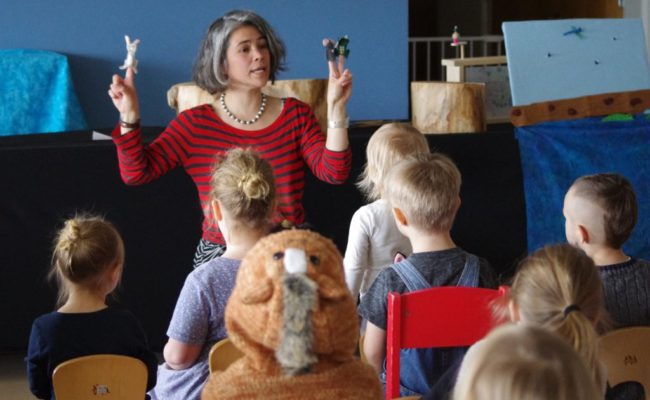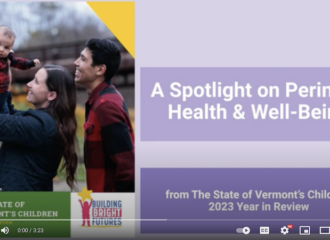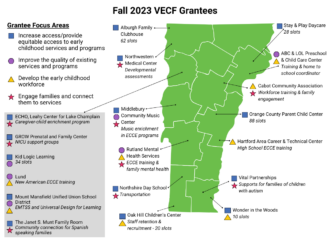
By Dora Levinson
Appreciative Inquiry is a philosophy that looks at systems and asks the question, ‘What’s right?’ rather than ‘What’s wrong?’.
There is no doubt that early childhood systems in Vermont face significant challenges. Families struggle to have their basic needs met. There are not enough accessible child care and early learning opportunities. Service providers are often not adequately compensated for their work or incentivized to remain in early childhood arenas.
However, this traditional deficit-based view often leaves out the functional and even thriving elements that could provide a foundation for sustainable and effective change.
 My own experience with the appreciative philosophy stems from a Positive Solutions for Families parenting class. This class was based on the Nurtured Heart Approach, which builds on the Inner Wealth of children and adults. I had expected to be learning about effective consequences to make it possible to get through the day. Instead, we spent much of the class looking at our responses to our children’s behavior. I found that I had a much larger energetic response when there was challenging behavior than when there was an expectation met (i.e. a furious face and angry tone with a flurry of words versus a lukewarm ‘Good job.’)
My own experience with the appreciative philosophy stems from a Positive Solutions for Families parenting class. This class was based on the Nurtured Heart Approach, which builds on the Inner Wealth of children and adults. I had expected to be learning about effective consequences to make it possible to get through the day. Instead, we spent much of the class looking at our responses to our children’s behavior. I found that I had a much larger energetic response when there was challenging behavior than when there was an expectation met (i.e. a furious face and angry tone with a flurry of words versus a lukewarm ‘Good job.’)
I started paying close attention to my reactions and intentionally focusing my energy on my child’s positive behaviors. It was powerful to watch how this change in my response transformed the feedback cycle from negative to positive.
Together, he and I felt more successful and that made it easier to continue succeeding.
2018 Month of the Young Child
In Southeast Vermont, one thing that is right is the annual Month of the Young Child (MOYC) in April. This year, there were 27 separate events with opportunities to make art, explore nature, sing, dance, and listen to stories. These fun and developmentally appropriate events helped to build a sense of community and to get families out of the house after a long winter.
 All events were totally free, with time, space, and supplies generously donated by area partners. There was access to information about parenting, services, and resources in the area. These events also provided a space for families to connect with one another on their terms to build social connections and resiliency.
All events were totally free, with time, space, and supplies generously donated by area partners. There was access to information about parenting, services, and resources in the area. These events also provided a space for families to connect with one another on their terms to build social connections and resiliency.
Parents were able to see if their child was interested in using found items to make art at the River Gallery School of Art[1] without having to commit to a longer course.
At the Brattleboro Food Coop[2], kids were able to get their hands into different doughs for both a sensory experience and exposure to the joys of cooking.
At the Early Education Services[3] Family Fun Event, there was music, crafts, free books, and bag lunches.
At the Green Street Promise Community[4] Pathway Opening Celebration, the community was invited to enjoy a new walking path through a residential community near a local elementary school.
And at the 14th Annual Young Children’s Art Exhibit during Brattleboro’s Gallery Walk[5], children were able to see their own art displayed in the same place as juried shows are often on view.
 In addition to the many successful events, the planning process was a wonderful model of partnership between over a dozen local organizations and interested parties who came together with an early childhood focus. According to Sarah DiNicola of The Winston Prouty Center[6], there was an organic evolution of events and connections. The planning meetings were composed of a true cross-section of stakeholders who all appreciated the opportunity to share their energy and ideas to offer a variety of events for families.
In addition to the many successful events, the planning process was a wonderful model of partnership between over a dozen local organizations and interested parties who came together with an early childhood focus. According to Sarah DiNicola of The Winston Prouty Center[6], there was an organic evolution of events and connections. The planning meetings were composed of a true cross-section of stakeholders who all appreciated the opportunity to share their energy and ideas to offer a variety of events for families.
Moving Forward
Here are three lessons that I see coming from the success of MOYC, and building on those strengths:
It’s fun to celebrate! MOYC Committee members were happy to be at meetings planning these celebratory events and are now able to celebrate concrete outcomes themselves with visible results that energize the community.
Where can we find fun in our work for children and families? Where can we add small (or large) measurable goals to create a sense of accomplishment in our work? Are we making sure to celebrate when we achieve existing goals?
Ready! Fire! Aim! The organic evolution of the MOYC committee, both originally and on a yearly basis, has a strong foundation and common goals, but there is freedom in what the specifics look like.
Are there places where increased autonomy within existing structures would allow for a shared sense of ownership and engagement?
 Variety is the spice of life! There were 27 different activities geared toward different populations, interests, and availability. Having a physical booklet or ‘menu’ of options within the early childhood arena allowed for families to choose events based on scheduling and interests. This variety also allowed for different groups of people to come together.
Variety is the spice of life! There were 27 different activities geared toward different populations, interests, and availability. Having a physical booklet or ‘menu’ of options within the early childhood arena allowed for families to choose events based on scheduling and interests. This variety also allowed for different groups of people to come together.
Are there additional opportunities to tie together events and resources into an accessible and relevant booklet?
In my short time as Southeast Vermont’s Regional Coordinator for Building Bright Futures, I have been learning about some of the many strengths of these communities. I am excited to find out more!
For More Information
More information about the Appreciative Inquiry (AI) methodology can be found on the website[7] of the David L. Cooperrider Center for Appreciative Inquiry at Champlain College. The center collaborated with Building Bright Futures on the Building Vermont’s Future from the Child Up[8] process.


